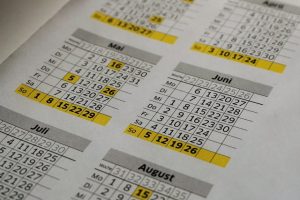The Idlewild Foundation is committed to the Biblical concept of financial stewardship. Stewardship is about much more than just giving, it is all about living better. The wise handling of your money is an essential aspect of reducing stress in your life, having a solid financial plan, and securing your financial future. When your eyes are not on your money problems, your creditors, and your bills, you are free to focus your attention on the important things in life; God, your family and your work. Matthew 6:33-34. We have a few practical ideas to get you started.
Start saving
Your goal should be to save at least 10% of your gross income each year. Over time, your savings will build and give you far less stress and many more opportunities. How can you do that? Today we start 11 months of ideas for saving money, reducing expenses (which means saving money), learning about our money (which means saving money) and more. And even better, saving and being frugal is Biblical. Proverbs 21:20. Here is the first month’s ideas for starting to save.

Collect your change
Any time you buy something with cash, save the change. If you go to the grocery store and your bill comes to $82.43, pay $85 in cash and pocket the $2.57 change. Then, when you get home, put that money in a good-sized jar or can. Keep this up. If you do this consistently, you will save hundreds and are likely to save more than one thousand dollars each year. The hard part is resolving not to raid the jar. In year two, turn that jar into a savings account.
Enroll in an automatic savings plan
Automatic savings plans are commonly offered by employers. This is a form of “forced” saving since the money never makes it into your paycheck or bank account. It is harder to spend what you can’t access easily.
Have 3 months living expenses as a security fund
Most financial advisers say you should have a minimum of 3 months of living expenses in accessible savings in case a job is lost or some financial or medical emergency strikes. Far too many Americans live within two months of being homeless because they have little or no financial reserves. If 3 months is unrealistic in your present circumstances, start somewhere and slowly add on. Have a reserve, a margin, a safety net, whatever you may want to call it. A little is better than none at all. But keep your eye on the 3 month target.
It is wise to plan ahead
Proverbs 13:16 says “Wise people think before they act; fools don’t, and even brag about their foolishness!” (NIV)
Enough said! Plan ahead; it is both wise and Biblical.
Set goals
If you fail to plan you have planned to fail. Having goals and planning how you can reach those goals matters a lot. And goals, whether short, medium or long term, need to be funded. You will find that having reasonable and attainable goals is motivating and may help you enjoy life more. A few ways to make your goals attainable and to cut your expenses (and save too) include:
Have a budget
Those who budget realistically are far better off financially over the course of their lifetimes. Include savings and giving as a part of your budget. Then, after a year, look back and see how you did. Idlewild offers classes that will help you develop a plan with your money and teach you God’s ways of handling it, Financial Peace University. Through video teaching, class discussions and interactive small group activities, FPU presents Biblical, practical steps to get from where you are to where you’ve dreamed you could be. Classes meet for two hours each week for nine weeks and are offered several times each year.

Not as solid and not Biblical, there are online financial and budgeting aids available. You might try Intuit’s Mint at https://www.mint.com or the tools at SunTrust’s ONUP.com. Also, wise budgeting is Biblical. Proverbs 24:3-4.
Shop less, but buy wiser
Try cutting out fast fashion brands and boredom shopping completely out of your life. When you do buy, spend a little more and go for quality. There is a good reason why it is called “quality” and quality tends to pay off in the long run.
Try a take out and eat out free month
Make this your goal. Plan to not order any takeout or delivery and to eat out less. If you order $20 worth of takeout/delivery a week, that’s $80 less you spend away from home. One restaurant meal can easily top $20. While you will still spend some to eat at home, you should be saving at least $10 per month or $120 per year. Put the money you saved in your change jar.
Go through your phone bill; eliminate what you don’t use or need
There are many strategies to save money on your cell phone bill. Review your current plan and minutes. Are you paying for minutes or services you’ll never use or need? Consider switching from one of the big providers to a smaller company. After all, will you really need cell service in the North Dakota badlands?
Get and use a crock pot
A slow cooker is one of the best ways to reduce cooking costs (and time) for a busy family or even for a single. You can just put in your meal before you leave for work, put it on slow cook, and enjoy the meal when you get home. There are many recipes available on the Internet for free for all types of food and all styles of eating. And when you cook this way, you save money. Cook enough and you will find that crock pot meals are good as leftovers for lunch or dinner, which means additional savings.
Inflate your tires
If a vehicle’s tires are under inflated by only 6 psi you are risking tire failure. Additionally, the tire’s tread life could be reduced by as much as 25%. Lower inflation pressure will allow the tire to bend more which builds up internal heat, increase rolling resistance and reduces fuel economy up to 5%. That’s a lot month after month. Check your car’s manual or the inside of the driver’s door for the recommended tire pressure. Tire gauges are really inexpensive and many air pumps at gas stations have one built into the pump. If you have to, borrow one from a friend, most guys have 2 or 3 laying around. Check your tires, then use the pump to fill them up to where they should be.
Cancel magazine and/or newspaper subscriptions
Do you have unread magazines at home? It’s usually because you have a subscription from years ago that you’re no longer reading. First, try to cancel for a refund. If that does not work, be sure it is not automatically renewed. Funny enough, you will likely get 2 or 3 months for free as they try to convince you to renew (at lower and lower rates each month). If you challenge your rate for your newspaper, you may get a lower rate.

Buy less soda or coffee
Don’t just say you will “cut down” or “buy less.” Make it measurable. If you currently buy two sodas a day or seven cups of coffee a week, cut it in half and enjoy them as a treat. Soft drinks at a convenience store are easily over a dollar. This way you will save $7 dollars per week. If your coffee is $2.50 (and many are more), you’ve gone from spending $17.50 a week to only spending $8.75 a week (if you can figure out how to get a half coffee, if not, cut down to three per week and save more). For the month, if you bought three coffees a week instead of seven, you’d spend $30 on coffee as opposed to $75. And put the money you saved in your change jar.
No bottled water – use a reusable water bottle
Bottled water is a very expensive product on the consumer market. Gasoline at the highest point the past few years has been around to $3.50 per gallon. But bottled water at $1 per small (16 ounce) bottle equates to $8 per gallon. Most public water supplies are good for drinking, so drink it and save. A bottle a day will result in average savings of $30 per month, $360 per year. Put the money you saved in your change jar.
Walk more
If you spend any on cabs, Ubers, Lyfts, or your own car, the solution might be to cut the short driving trips out of your life. Of course, if you have a 5 mile commute to work, don’t try to walk. However, if you’re in the habit of driving the mile to a friend’s house, or to your favorite store, this could be where you forego the car/cab trip and talk a walk instead. Save on gas, wear and tear, and add better health to your agenda. The IRS approved mileage reimbursement amount was 54 cents per mile in 2016. That is intended to cover wear and tear, tires, gas, oil, etc. You are saving that every time you walk instead of ride. A mile a day amounts to savings of over $180 per year. Put the money you saved in your change jar.

Master the 10-second rule
When you pick up an item while shopping, stop for 10 seconds and ask yourself two questions: “Why am I buying this?” and “Do I really need this?” Impulse buying, especially when you grocery shop when you are hungry can add to your expenses rapidly.
Remove your credit card numbers from your online accounts
Why do online sites want to store your credit card data? To make it easier for you to shop with them! But that is the opposite of what you want. It is far easy to spend money online when you have your credit card information stored, just click checkout and buy. Delete your credit card from the account and make shopping less convenient – you’ll spend less and save more.
Cancel unused club memberships
Are you paying dues at a club that you no longer use, like that gym membership that sounded so good and necessary after overeating during the holidays? If you’re not using them enough, just cancel them. All that walking you will do as you have eliminated short drives will burn those calories anyway!
Plan meals around your grocery store’s specials
Plan all your meals around what you already have and around what is on sale, especially BOGOs in your grocery store’s ads. Always look for the best sale prices, then plan your meals based on those specials and what you have. Do that for a few weeks and you will be surprised; you will have a lower food bill than you’re used to.
Swap books, music, and DVDs on the Internet or at the library
You can easily swap the books, CDs, and DVDs online. Try using sites such as PaperBackSwap. Perhaps even better, the Hillsborough County Public Library checks out DVDs as well as books. So does the Helen Enns Memorial Library at Idlewild Baptist Church. Come early one Sunday and check out the fabulous selection. It is hard to do better than free!
Reduce your debt
Owing money is stressful, and watching compound interest eat into your future is even worse. Your ultimate goal is to become (and stay) debt free. Debt can be a cruel master. Proverbs 22:7. In the short run, owning a home and college education for yourself or your children may make that impossible. But no one ever said your goals should be easy or reachable without time and effort. Ways you can start towards that goal include:
First, Prioritize Your Debts
Know that not all debt is equal. Make a list of your debts and their interest rates. Then organize them by the annual interest rate. Those with the highest rates (almost always credit card debt) should be paid off first, immediately if possible.
Frankly, it does no good to invest money while you are paying 18 percent or more in interest. Often the best course of action is to liquidate some assets and pay the balance of a high interest loan or credit card. If you owe $1,000 on your credit card and pay 18 percent interest annually ($1,800 per year even ignoring compound interest), while you have a $1,000 account balance at a bank, paying you 1 percent interest ($100 a year), you would actually save yourself $900 by paying that debt. Put the money you saved in your change jar.

Review Your Spending History
Every year you should spend a few minutes going through your bank and credit card statements looking for a few particular things. Look for and eliminate unnecessary repetitive charges like transaction or monthly fees. Change your bank or your spending habits so you benefit from free or lower cost opportunities.
But don’t stop there. Review all of the financial products you use such as credit cards and especially insurance. Shop around for the best deal – just receiving and paying a bill is very likely to cost you a great deal of money. Do not automatically wait until renewal time to change insurance companies, especially auto and home policies – if you find a better policy at a better price, switch over if it saves you money. Put the money you saved in your change jar.
Review Your Credit Report and Sign Up Free Credit Monitoring
Free credit scores and free credit reports are available – get them and use them. In this age of identity theft, make this a yearly activity if you are not subscribed to a credit or identity protection service. Not enough people are familiar with their credit reports. According to the Federal Trade Commission, almost 25 % of all Americans have a credit report containing an error that could affect their credit score. And examining at least one of your major credit reports on a regular basis may allow you to catch and stop fraud or identity theft. One place to start is by checking your free TransUnion credit report on WalletHub. Even better, get a copy of all three reports, from Experian, Transunion and Equifax. Go to https://www.annualcreditreport.com/requestReport/landingPage.action, a joint website set up due to the Fair Credit Reporting Act and the Federal Trade Commission where you can get a free report one time a year from each of the three companies.
Having good credit matters a lot and is something that is far from impossible. But it take attention to details. Paying bills on time, not ever being delinquent, and many other steps can help you improve your credit score. Check out the free services of CreditKarma.com to help you learn how to build better credit and avoid pitfalls. Financial emergencies do happen and you may have to borrow money is such an emergency. Having good credit can make getting an emergency loan easier, faster and cheaper.
There are free credit monitoring platforms that are available as well. They include Intuit’s Mint.com at https://www.mint.com/ and WalletHub at https://wallethub.com/free-credit-monitoring/. There are others, so check online for which works best for you. And if you use online banking, there are often alerts and notices you can set which will add to our financial security – and they are free with your online banking.
Educate yourself
Attend free seminars, read financial sections of the newspaper and improve your general money knowledge. There is a lot available at low or even no cost to help you learn to improve your finances. The opportunities for learning in our digital age are like nothing in history. Or you can be old fashioned and go to the public library. Of course you do have to be careful because there are many unreliable, dishonest, and even whacky investing ideas, especially on the Internet. But seek the recommendations of a good financial adviser or trusted friend and learn about your money. The Idlewild Foundation can give you ideas on good sources of information.
Donate generously
Never forget God in your plans. Every dollar you make – even every breath you take – requires our Creator. And the tithe only starts at 10%, so don’t limit your giving by that figure. But here is an idea to giving over and above the tithe that may encourage you. Many people have said that one of the most effective ways to realize the value of money is to give it away. Walk into a fast food restaurant or go through a drive through and pay anonymously for another customer in line. Sometimes, giving when you don’t have to give and when it is unexpected can be a great blessing. The surprised beneficiaries will certainly remember your stealth kindness. It is a blessed and effective way to change another person’s attitude, even if only for a day. Now you will see just how much hope a $20 bill has in it.
The goal? Add a month’s pay to your rainy day fund
Roughly 54% of Americans do not have a rainy day fund, according to the Financial Industry Regulatory Authority. This is living without insurance which is no better than driving without insurance. You are merely tempting fate and testing God as you put yourself at risk. Building up financial reserves should be one of the first orders of business for your new year. As noted earlier, financial planners recommend a minimum of three months expenses. Frankly, more is better. Try to eventually build a rainy day fund with about 12 to 18 months’ of your take-home income. Start with the goal of adding one month’s income to your fund this year. Then keep adding on.
Live within your means
The idea is Biblical but not at the heart of modern America. See Hebrews 13:5 and Matthew 6:33-34. Know that at this time, you are doing the best and wisest that is possible and be content.
Enlist a professional
A qualified and experienced financial planner can give you ideas to help you achieve your financial goals for yourself and your family. There is nothing easy or automatic about handling your finances in the best manner. Government regulation, market competition, and complex business structures can make financial wisdom difficult on the easiest day. You will appreciate the benefit of wise counsel. Proverbs 12:15 and Proverbs 15:22. A financial planner will work with you to make the most of your income and help you plan for a financially comfortable lifestyle. The Idlewild Foundation can give you a list of qualified and capable advisers and help you reach your goals, in Christ, with less confusion and uncertainty.
Boost your contributions to your retirement plan
If your employer offers a 401(k) or other retirement plan, take full advantage of it, especially if your employer “matches” a part of your contributions. Earnings have the potential to be and to grow tax deferred and your contributions may lower your taxable income. And many plans offer a selection of investment options, so you can choose the investment mix that fits your objectives and risk tolerance. If your income goes up this year, or if some of the ideas given above allow you to save some extra money, you may be able to and probably should increase your contributions to your retirement plan.
And watch the investments your retirement plan monies are put into. Under Federal Law, most employers or retirement plans will offer some education, assistance or advice on what investment options are best for your individual circumstances and life stage.
Master the 30-day rule
Patience is more than a virtue, it is a fruit of the Spirit. Grow to avoid instant gratification. Waiting 30 days on a purchase is an excellent way to use that virtue. After a month you may find that the urge to buy that special something that called your name has passed as well. Then you will have saved money simply by waiting. If you are not fully committed and certain of your purchase, waiting a while can give you a better perspective on whether it’s truly worth the money. And try prayer first. God has answers to questions you have not even asked yet. And then put the money you saved in your change jar.

Take a long view
You are investing for the future, maybe even many years from now. Think long-term when you are making your most important saving and investment decisions. If you do that, you may be able to avoid overreacting to short-term developments, such as sudden drops in the market or a “momentous” political event. Many events shake the market and consumer confidence for a few days but then when investors see the sky really isn’t falling, the market recovers and the world goes on.
Pay your bills as they come in or when you receive your paycheck
Take care of your monthly obligations (including your tithe of first fruits to your church) before you dare allow yourself to indulge in any luxury expenses is a foundational budgeting strategy. This may give you a better sense of what you can truly afford and what you can’t and may help you differentiate between wants and needs. Paying bills right away is also a way to avoid forgetting or losing a bill or accidentally paying a few days late, something that can be hazardous to your credit rating.
Change your family’s money mindset
Failing to fulfill a resolution makes your resolution a lie to yourself. Failure is often rooted in weak thinking and faulty, even sinful, behaviors. Our patterns of thinking, believing and behaving prevent us from seeing new alternatives. Work to gain a new and healthier perspective on what can be changed. Excuse making and blame-shifting does not work. When we make excuses or point fingers, we are failing to realize the fact, and it is a fact, that none of this is ours anyway, it all belongs to God.
Missing a goal could be on account of a lack of financial wisdom, and the source of that wisdom is God’s Word. So if there’s only one resolution you make (though you should make several), remember to include God in your finances, Next, know that less can mean more. Less credit card spending means more chance at staying out of debt; less spending on unnecessary purchases (like eating out) means more money to save.
Think about what you’d like to save for (college tuition, children, a new home, college for yourself, children or grandchildren). Then consider how long it will take to cut expenses, be careful and wise, and save towards your goals.
Make these resolutions a family effort for your entire family
You should make financial planning a complete family endeavor. More than three-quarters of parents aren’t forthcoming when dealing with the family finances, especially the family giving. Tell your children about family finances and get them involved in financial decisions and especially giving decisions. Find opportunities to teach your children about tithing, saving money, spending less and the value of earning compound interest; teaching them about these basic money concepts can help give you the clarity you need to focus on your family’s finances for the New Year. The Idlewild Foundation can help in this area. See our Resources for Parents.

We hope these ideas for wise stewardship have been a blessing. You have now reached the end of another year. As you enter continue in life, if you have not started with wise and Godly stewardship yet, start now. If you have started, then take an extra step or two and make your future even better. Godly stewardship is a blessing.
If you have any additional ideas or any comment, please call or email The Idlewild Foundation. jcampbell@idlewild.org and (813) 264-8783. We value your input.

About the Author

John Campbell has retired from a 40-year legal practice as a trial attorney in Tampa. He has served in multiple volunteer roles at Idlewild Baptist Church in Lutz, Florida, where he met Jesus. He began serving as the Executive Director of the Idlewild Foundation in 2016. He has been married to the love of his life, Mona Puckett Campbell, since 1972.
